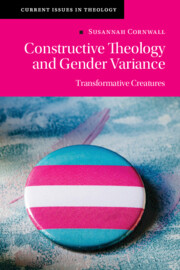Book contents
- Constructive Theology and Gender Variance
- Current Issues in Theology
- Constructive Theology and Gender Variance
- Copyright page
- Dedication
- Contents
- Acknowledgements
- Part I Setting the Scene
- Part II Telling Truths
- Part III Limits, Technology, and Health
- 7 Technological Interventions and Licit Limits
- 8 Trans People, Health, and Diversities of Order
- 9 Fertility, Generativity, and Gender Theology in the Optative Mood
- Part IV Transformative Creatures
- References
- Author Index
- Subject Index
8 - Trans People, Health, and Diversities of Order
from Part III - Limits, Technology, and Health
Published online by Cambridge University Press: 14 December 2022
- Constructive Theology and Gender Variance
- Current Issues in Theology
- Constructive Theology and Gender Variance
- Copyright page
- Dedication
- Contents
- Acknowledgements
- Part I Setting the Scene
- Part II Telling Truths
- Part III Limits, Technology, and Health
- 7 Technological Interventions and Licit Limits
- 8 Trans People, Health, and Diversities of Order
- 9 Fertility, Generativity, and Gender Theology in the Optative Mood
- Part IV Transformative Creatures
- References
- Author Index
- Subject Index
Summary
Theological responses to gender variance that object to gender transition sometimes do so, as we have seen, for distinct moral or doctrinal reasons. Often, however, objections are more ethical and pragmatic, prompted, at least ostensibly, by concerns about health. Sometimes objectors suspect – in defiance of the World Professional Association for Transgender Health (WPATH), the World Health Organization, and various mainstream therapeutic bodies – that gender dysphoria and/or a desire to transition gender are themselves pathological, pointing to underlying mental illness. Sometimes there are concerns that apparent gender dysphoria masks deeper underlying problems such that people who believe that they want to transition will actually be no better off afterwards than they were before. And there has been particular anxiety in recent years about an apparent mental health crisis amongst young people, which has coincided with higher numbers of young people (especially those assigned girls at birth) seeking transition. In this situation, it may be unclear whether gender dysphoria is something with its own independent reality or a side effect of mental health problems whose most appropriate treatments may not include support for transition. In this chapter and Chapter 9 I discuss health-related questions prompted by the existence and experiences of trans people, again in the context of reflection on limits. I ask whether support for transition is indeed always the most appropriate response to gender-variant identity; I deal, too, with some ethical questions such as whether it is justifiable to undergo interventions that will compromise fertility and whether transition-related interventions may justly be prioritized when finances and resourcing for healthcare are scarce.
- Type
- Chapter
- Information
- Constructive Theology and Gender VarianceTransformative Creatures, pp. 218 - 250Publisher: Cambridge University PressPrint publication year: 2022



